Complete Solutions to EXERCISE 1 of chapter FRICTION IN SOLID AND LIQUIDS of Class 12 book with complete answers and questions
| Class 12 | PHYSICS |
| Chapter | FRICTION IN SOLID AND LIQUIDS |
| MHTCET PREP GUIDE | EXERCISE 1 |
| Number Of Questions | 49 |
| Academic Year | 2023-24 |
Maximum value of frictional force is called
View SolutionA mass placed on an inclined place is just in equilibrium. If `mu` is coefficient of friction of the surface, then maximum inclination of the plane with the horizontal is
View SolutionA `30kg` block rests on a rough horizontal surface A force of `200N` is applied on the block The block acquires a speed of `4m//s` starting from rest in `2s` What is the value of coefficient of friction ? .
View SolutionA block of weight of 5N is pushed against a vertical wall by a force 12N. The coefficient of friction between the wall and block is 0.6. The magnitude of the force exerted by the wall on the block is
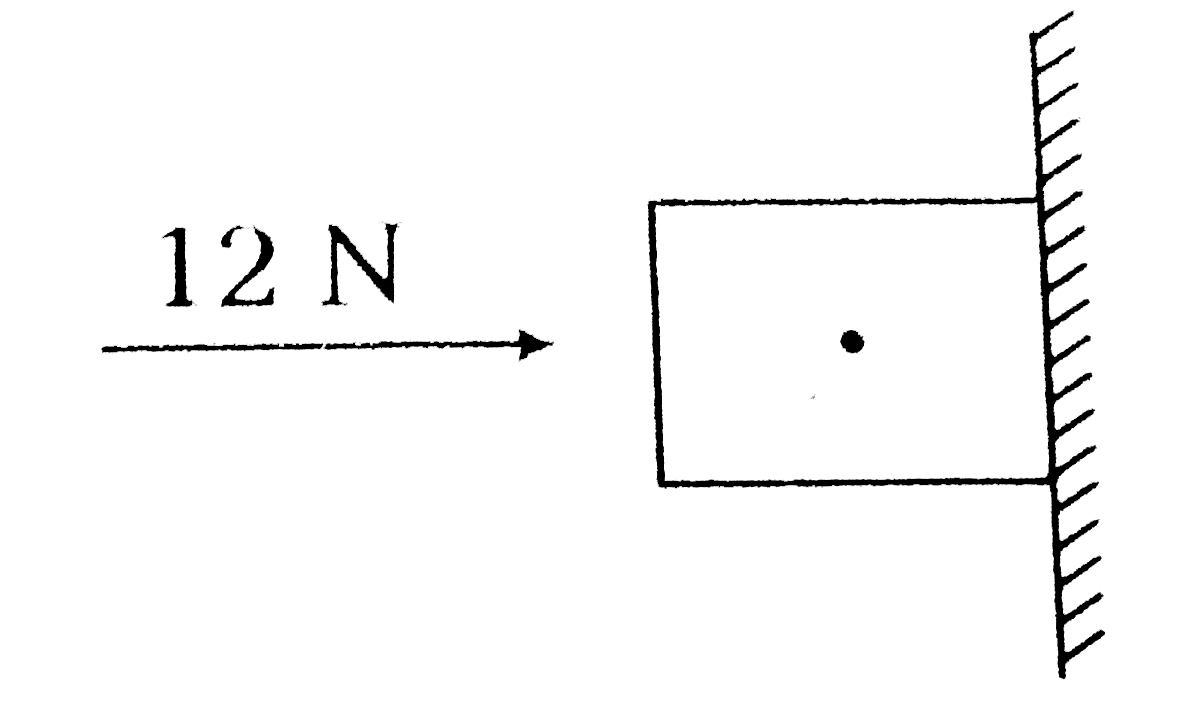
View SolutionThe coefficient of friction between the tyres and road is 0.4. The minimum distance covered before attaining a speed of 8 `ms^(-1)` starting from rest is nearly (take, g=10 `ms^(-2)`)
View SolutionA block of mass 2kg rests on a rough inclined plane making an angle of `30^@` with the horizontal. The coefficient of static friction between the block and the plane is 0.7. The frictional force on the block is
View SolutionA block of mass m is placed on the top of another block of mass M as shown in the figure . The coefficient of friction between them is `mu`
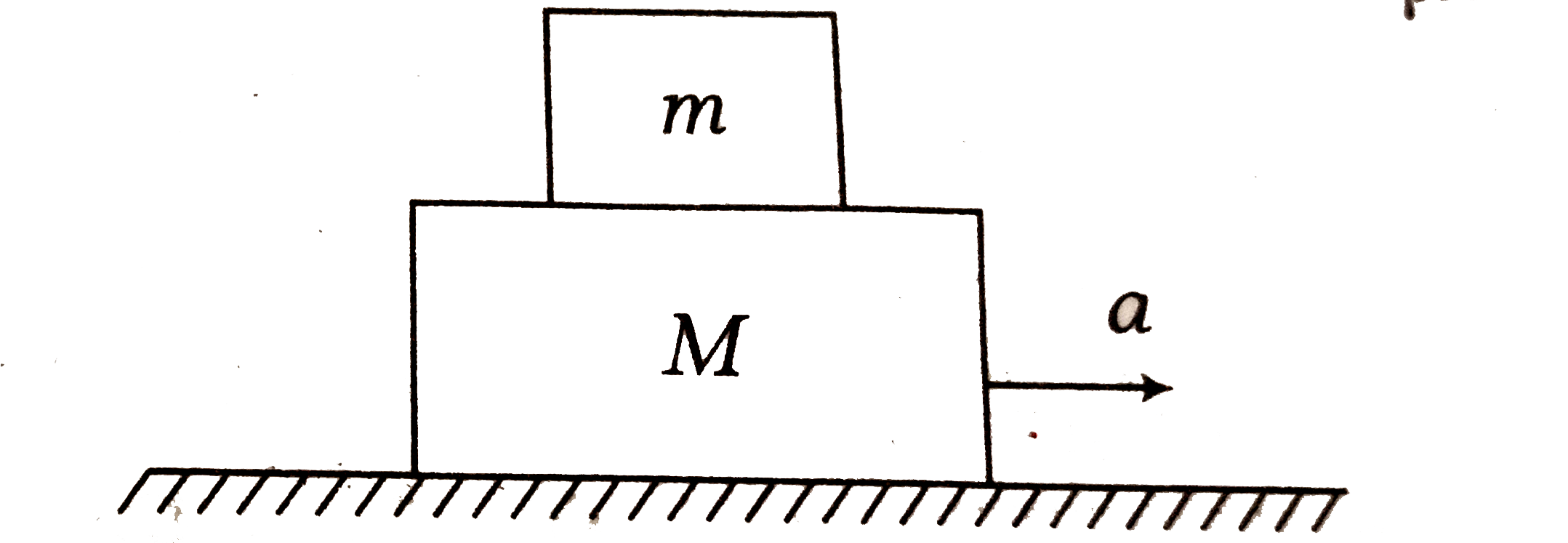
The maximum acceleration with which the block M may move so that m also moves along with it is
View SolutionThd dimensional formula of pressure is
View SolutionThe two thigh bones each of cross-sectional area `15 cm^(2)` support the upper part of a person of mass 70 kg. The pressure sustained by these thigh bones is
View SolutionAt a depth of 1000 m in an ocean (a) what is the absolute pressure? (b) what is the gauge pressure? (c ) Find the force acting on the window of area `20 cm xx 20cm` of a submarine at this depth, the interior of which is maintained at sea-level atmospheric pressure. The density of sea water is `1.03 xx 10^(3) kg m^(-3)`, `g=10ms^(-2)`. Atmospheric pressure = `1.01 xx 10^(5) Pa`.
View SolutionFour vessels A, B, C, and D have different shape and hold different amount of water. Which of the following is correct?
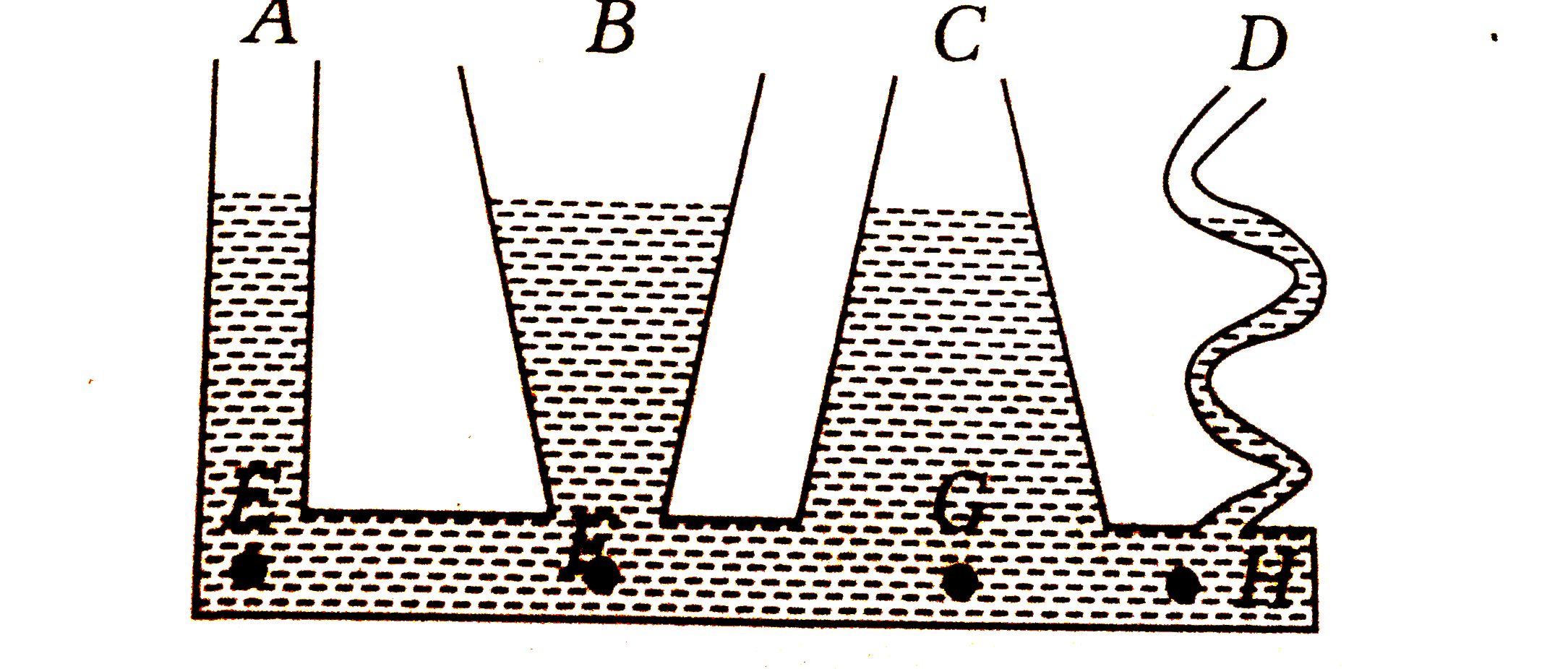
View SolutionTwo liquids of densities `2 rho " and " rho` having their volumes in the ratio `3 : 2` are mixed together. Density of the mixture will be
View SolutionAn object of uniform density is allowed to float in water kept in a beaker. The object has triangular cross - section as shown in the figure. If the water pressure measured at the three point A, B and C below the object are `P_A, P_B " and " P_C` respectively . Then
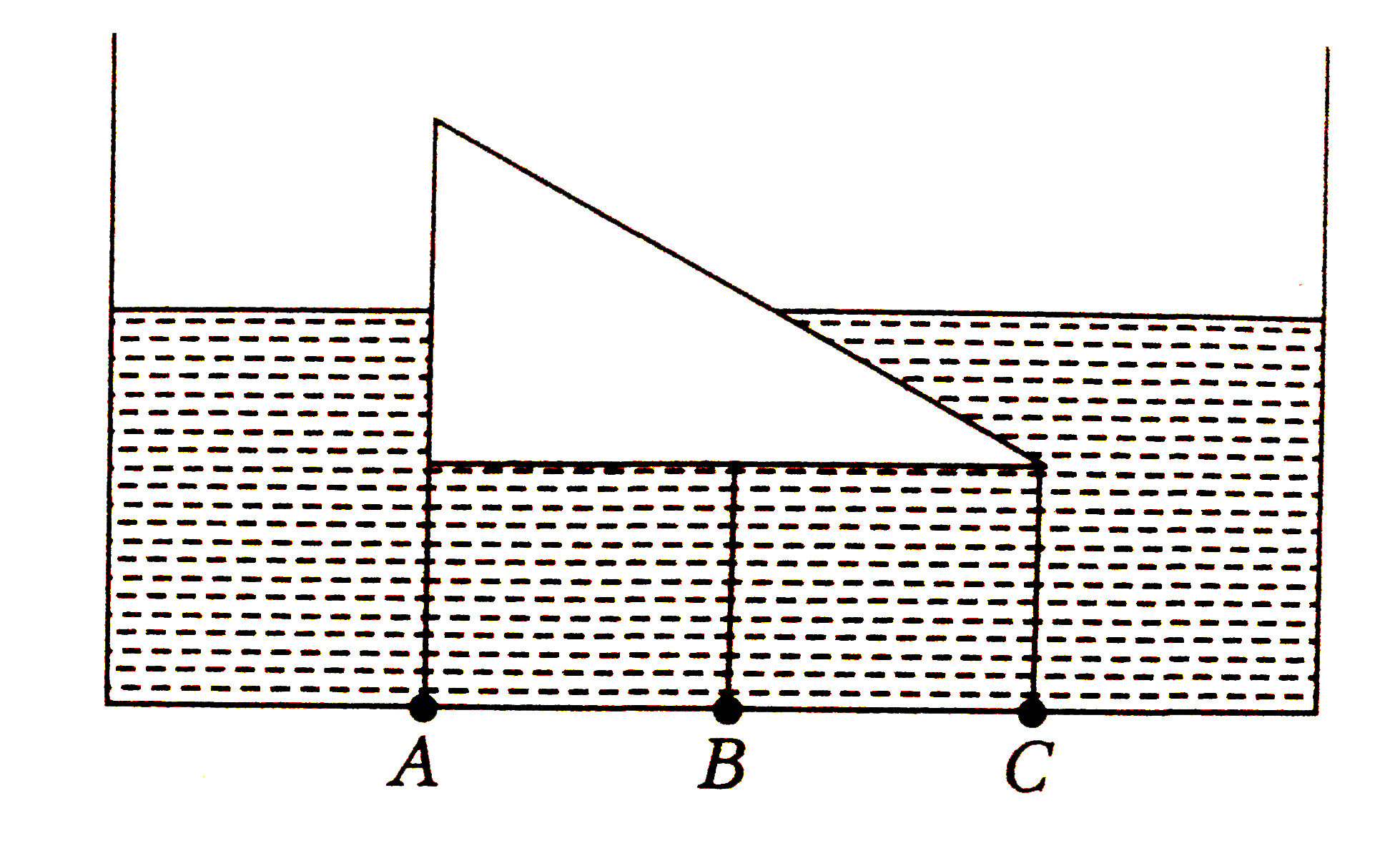
View SolutionA piston of cross-section area 100 cm 2 is used in a hydraulic press to exert a force of `10^(7)` dynes on the water. The cross-sectional area of the other piston which supports an object having a mass `2000 kg`. Is
View SolutionIn the given figure , the velocity `V_3` will be
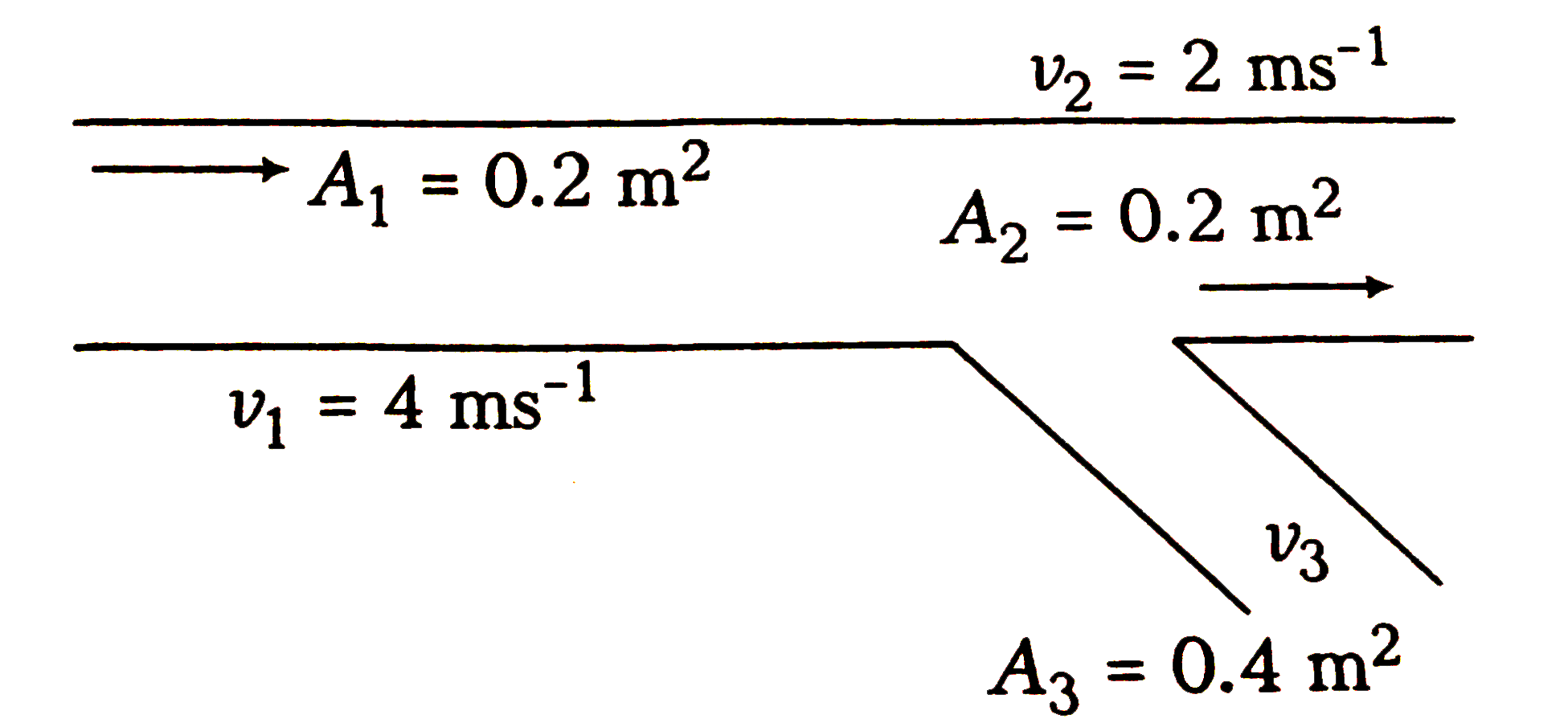
View SolutionAn ideal fluid flows through a pipe of circular cross-section made of two sections with diameters `2.5 cm` and `3.75 cm`. The ratio of the velocities in the two pipes is
View SolutionBernoulli's equation is a consequence of conservation of
View SolutionA horizontal pipeline carries water in a streamline flow. At a point along the pipe, where the cross- sectional area is `10cm^2`, the water velocity is `1ms^-1` and the pressure is 2000 Pa. The pressure of water at another point where the cross-sectional area is `5cm^2`, is........Pa. (Density of water `=10^3kg.m^-3`)
View SolutionIf the velocity head of a stream of water is equal to 10 cm, then its speed of flow is approximately
View SolutionWater falls from a tap with `A_0 = 4m^2, A=1m^2` and h=2 m, the velocity v is
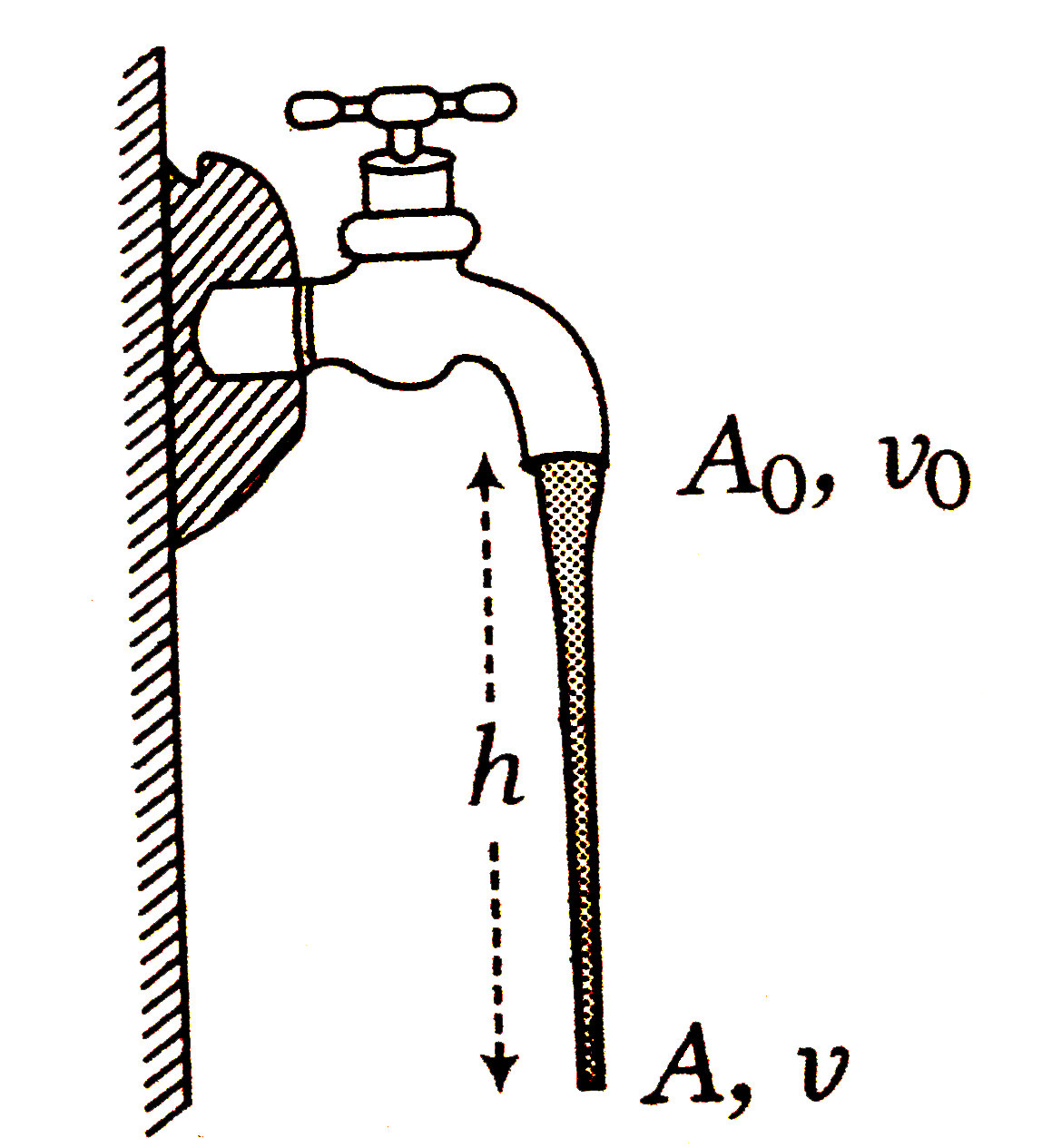
View SolutionThe velocity of the wind over the surface of the wing of an aeroplane is `80ms^(-1)` and under the wing `60ms^(-1)`. If the area of the wing is `4m^(2)`, the dynamic lift experienced by the wing is [density of air `=1.3kg.m^(-3)`]
View SolutionWater from a tap emerges vertically downwards an intial speed of 1 m/s . The cross-sectional area of the tap is `10^(-4)m^(2)` . Assume that the pressure is contant throughout the stream of water and that the flow is steady . The cross-sectional area of the steam. `0.15` m below the tap is
View SolutionThe pressure of water in a pipe when tap is closed is `5.5xx10^5 Nm^(-2)`. When tap gets open, pressure reduces to `5xx10^5Nm^(-2)`. The velocity with which water comes out on opening the tap is
View SolutionWater flows along horizontal pipe whose cross-section is not constant. The pressureis 1 cam of Hg, where the veloecity is 35 cm/s . At a point where the velocity is 65cm/s then pressure will be
View SolutionThe velocity of efflux of a liquid through an orifice in the bottom of a tank does not depend upon
View SolutionA tank is filled to a height H. The range of water coming out of a hole which is a depth `H//4` from the surface of water level is
View SolutionA container has a small hole at its bottom. Area of cross-section of the hole is `A_(1)` and that of the container is `A_(2)`. Liquid is poured in the container at a constant rate ` Q m^(3)s^(-1)`. The maximum level of liquid in the container will be
View SolutionThe lift of an air plane is based on
View SolutionAir is blow through a pipe AB at a rate of `15 L"min"^(-1)` . The cross sectional area of the broad protion of the pipe AB is `2cm^2` and that of the narrow protion is `0.5cm^2` . The differnce in water level h is (density of air = `1.32 kg m^(-3))`
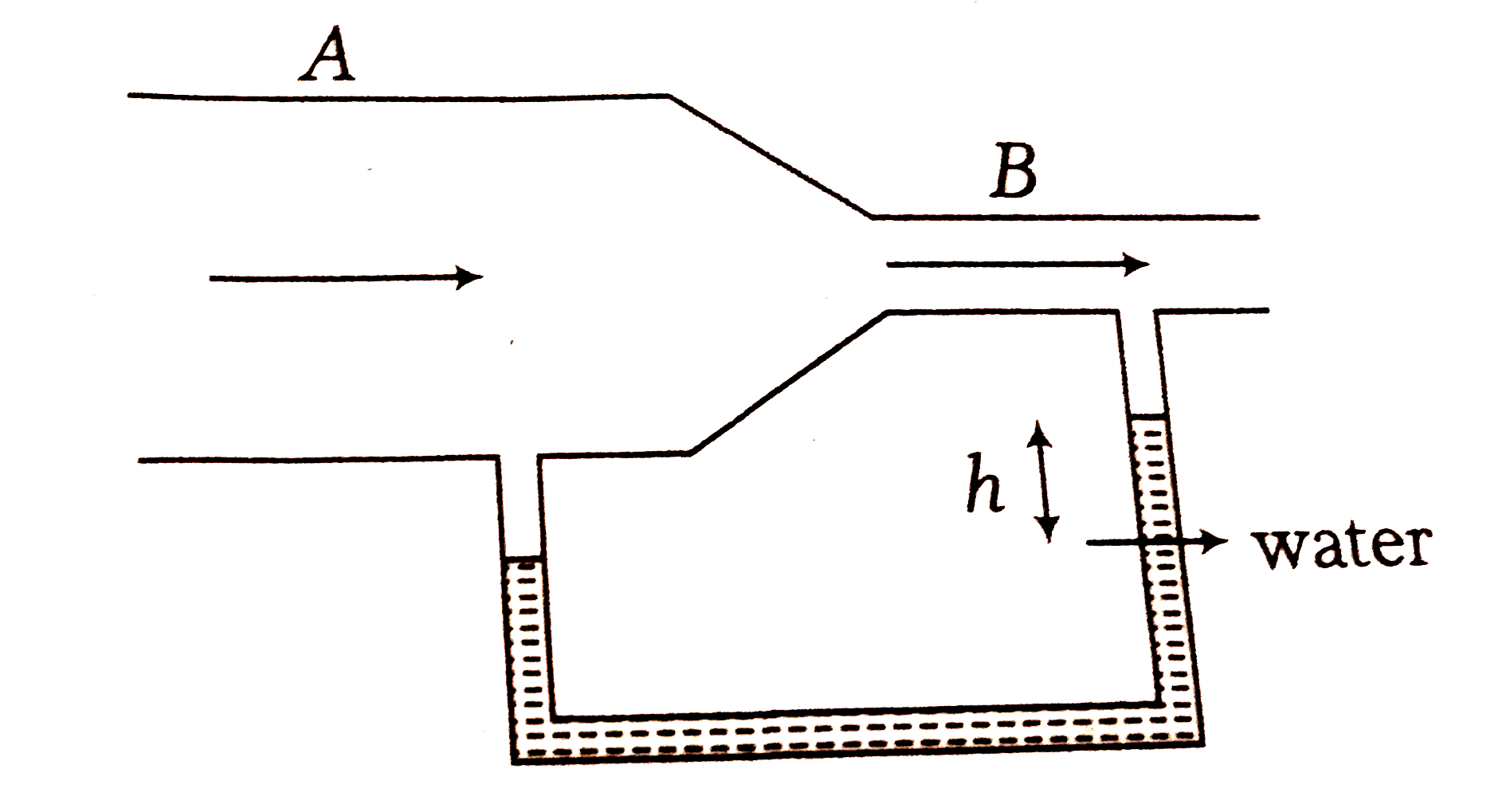
View SolutionA large tank is filled with water (density `=10^3kgm^(-3)`). A small hole is made at a depth 10m below water surface . The range of water issuing out of the hole is R on ground . What extra pressure must be applied on the water surface so that the range become 2R (take 1atm `=10^5 Pa " and " g=ms^(-2)` )
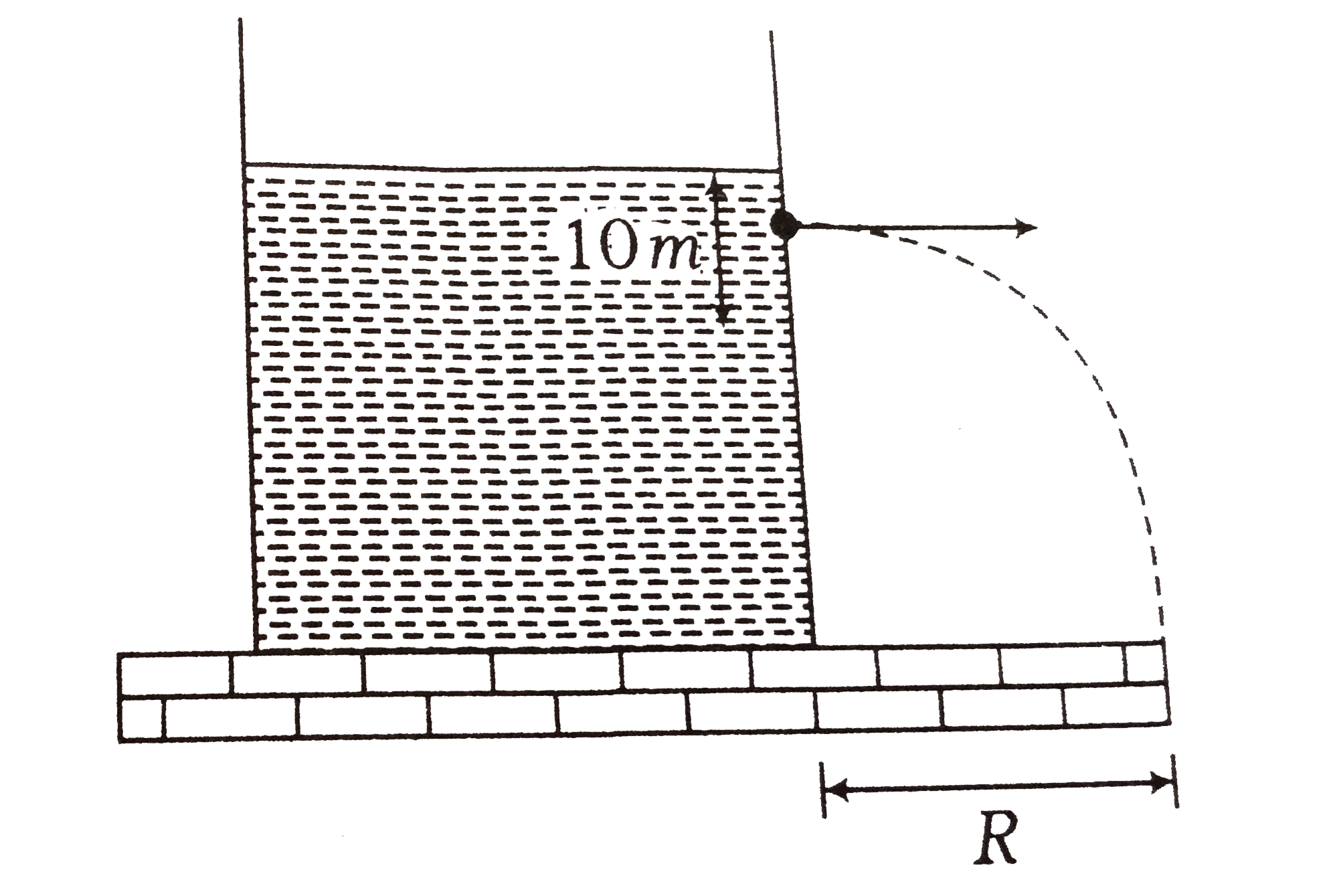
View SolutionThe water level on a tank is 5m high. There is a hole of `1 cm^(2)` cross-section at the bottom of the tank. Find the initial rate with which water will leak through the hole. (`g= 10ms^(-2)`)
View SolutionA water tank placed on the floor has two small holes, pinched in the vertical wall, one above the other. The holes are `3.3 cm` and `4.7cm` above the floor. If the jets of water issuing out from the holes hit the floor at the same point on the floor, then the height of water in the tank is
View SolutionThere are two holes `O_1 "and " O_2` in a tank of height H. the water emerging from `O_1 " and " O_2` strikes the ground at the same points, as shown in figure, then
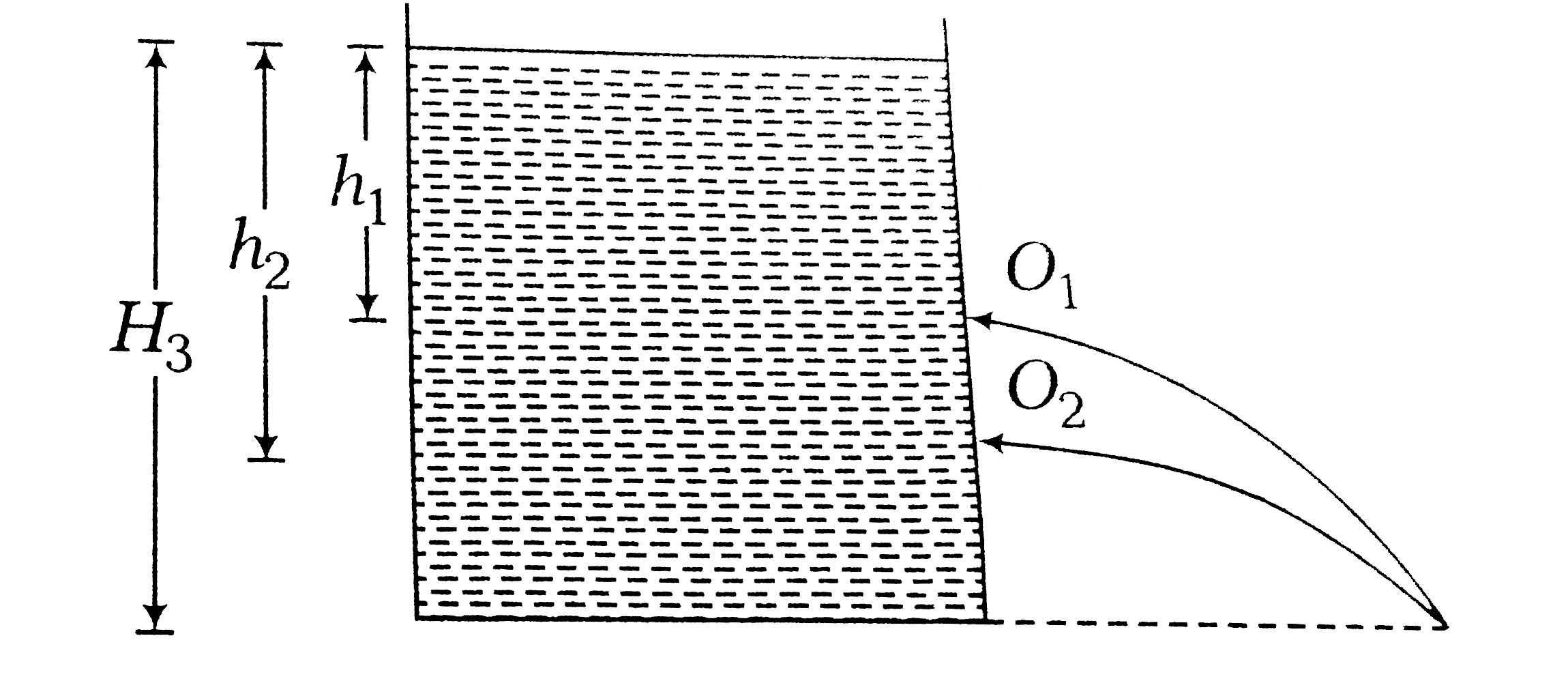
View SolutionA tank is filled to a height H. The range of water coming out of a hole which is a depth `H//4` from the surface of water level is
View SolutionThere is a hole at the bottom of a large open vessel. If water is filled upto a height h, it flows out in time t. if water is filled to a height 4h, it will flow out in time
View SolutionUnits of coefficient of viscosity are
View SolutionAs the temperature of water increases, its viscosity
View SolutionThe rate of flow of liquid in a tube of radius r, length l, whose ends are maintained at a pressure difference P is `V = (piQPr^(4))/(etal)` where `eta` is coefficient of the viscosity and Q is
View SolutionTwo capillary tubes of the same length but different radii r1 and r2 are fitted in parallel to the bottom of a vessel. The pressure head is P . What should be the radius of a single tube that can replace the two tubes so that the rate of flow is same as before
View SolutionA raindrop of radius 0.3 mm has a terminal velocity in air `1ms^(-1)` . The viscosity of air is `18xx10^(-3)` poise. The viscous force on it is
View SolutionA spherical ball of radius `3xx10^(-4)`m and density `10^(4)kg//m^(3)` falls freely under gravity through a distance h before entering a tank of water. If after entering the water the velocity of the ball does not change, find h the viscosity of water is `9.8xx10^(-6)N-s//m^(2)`
View SolutionTwo rain drops of same radius r falling with terminal velocity v merge and from a bigger drop of radius R. The terminal velocity of the bigger drop is
View SolutionFrom amongst the following curves, which one shows the variation of the velocity v with t for a small sized spherical body falling vertically in long column of viscous liquid
View SolutionThe terminal speed attained by an aluminium sphere of radius 1 mm falling through water at `20^@C` will be close to
View SolutionSuppose a block of mass `1kg` is placed over a rough surface and a horizontal force `F` is applied on the block as shown in figure. Now, let us see what are the values of force of friction `f` and acceleration of the block a if the force `F` is gradually increased. Given that `mu_(s) =0.5,mu_(k) =0.4 and g=10m//s^(2)`
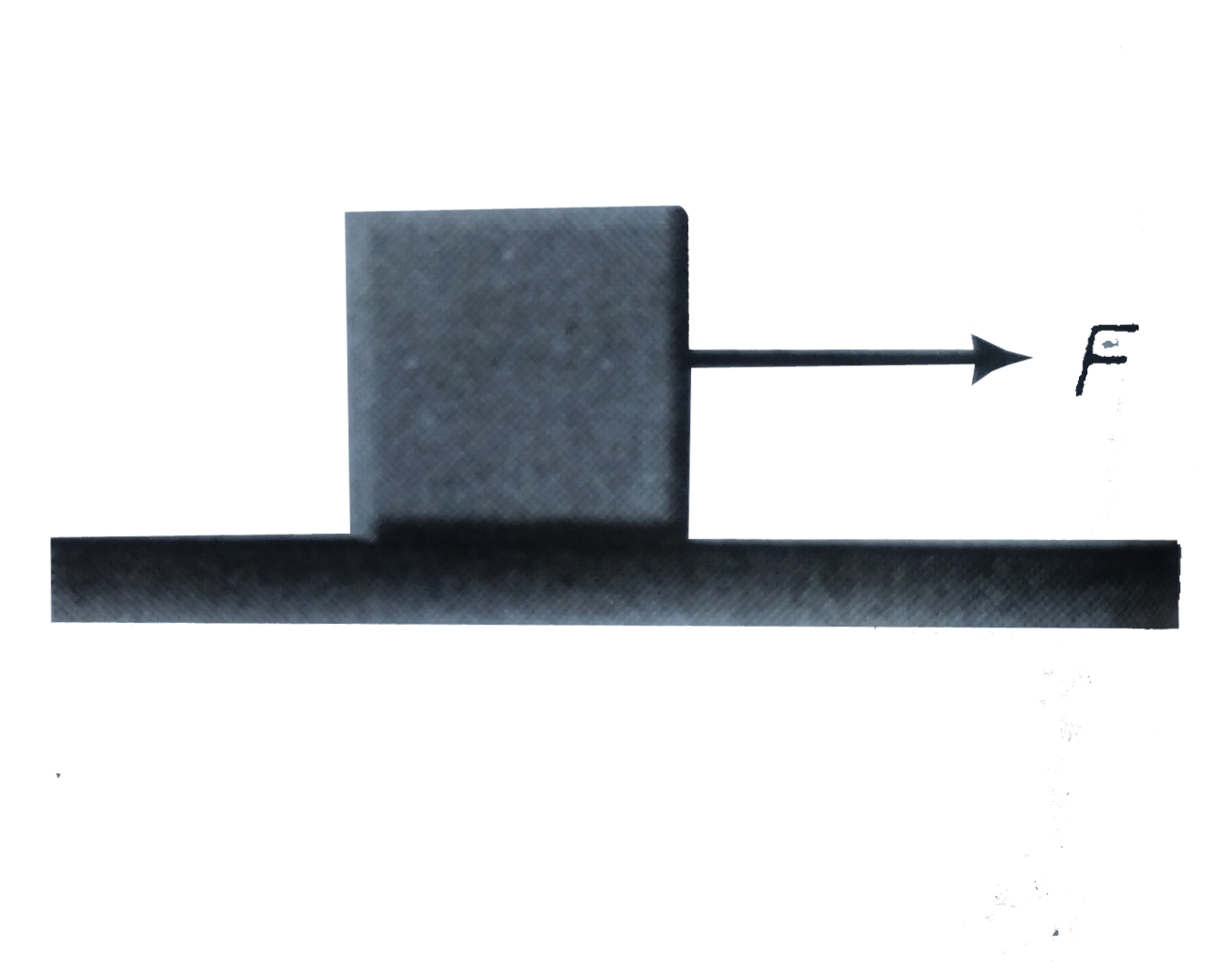
View SolutionIf the terminal speed of a sphere of gold (density `=19.5kg//m^3`) is `0.2m//s` in a viscous liquid (density `=1.5kg//m^3`), find the terminal speed of a sphere of silver (density `=10.5kg//m^3`) of the same size in the same liquid
View SolutionTwo equal drops of water are falling through air with a steady velocity v. If the drops coalesced, what will be the new velocity?
View SolutionA solid sphere falls with a terminal velocity `V` in `CO_(2)` gas. If its is allowed to fall in vacuum
View SolutionUniform speed of 2 cm diameter ball is `20cm//s` in a viscous liquid. Then, the speed of 1 cm diameter ball in the same liquid is
View Solution
EXERCISE 1 questions and complete solutions for chapter FRICTION IN SOLID AND LIQUIDS of MHTCET PREVIOUS YEAR PAPERS AND PRACTICE PAPERS of Class 12